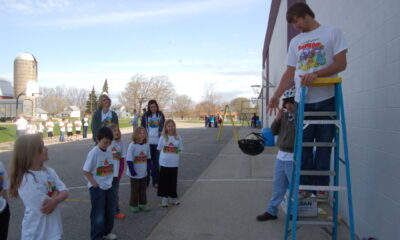Family & Home
Progressive Agriculture Foundation offers lifesaving tips to avoid electrical burns on the farm, ranch, and at home

Hoping to prevent burn injuries and even deaths before they happen, the Progressive Agriculture Foundation is sharing advice for the farm, ranch, and home.
Each year, in both the United States and Canada, approximately 450,000 people seek medical attention for burn injuries, according to the Progressive Agriculture Foundation. In 2014 alone, burn injuries claimed 3,275 lives.
“What is even more sobering is the fact that many of these burn-related injuries were preventable,” Jana Davidson, education content specialist, said.
To shed light on this important issue, the American Burn Association observes Burn Awareness Week during the first full week in February.
This year’s theme, “Electrical Safety from Amps to Zap!”, highlights burn injuries related to electrical dangers associated with unprotected electrical outlets, improperly used extension cords, lightning, and other workplace electrical injuries. For the past several years, electric safety has been one of the most popular topics offered at Progressive Agriculture Safety Days throughout North America, reaching nearly 50,000 youth participants in 2019 alone.
“That is one of our most popular topics because we’re trying everything from unprotected outlets to improperly used extension cords and lightning strikes,” Bernard Geschke, Program Specialist, said. “There’s a lot of things around the home and workplace where electrical injuries can happen. All of the hands-on activities and demonstrations we have are age-appropriate. We target kids from ages 4 to 13, so when you’re talking electrical safety to a 4-year-old, it may be different than that message to a 13-year-old.”
From large high voltage to smaller tabletop demonstrations, participants learn to always look up for overhead powerlines, as well as down below for potential dangers, obey the signs, and identify what to do if power lines fall on a tractor, truck, or car.
“We may have a power company bring in their big trucks and they will have a trailer that actually does a demonstration with high voltage lines to show what can happen if you’re flying a kite and get tied up in those wires and those types of things,” Geschke said. “The tabletop display will throw sparks for the kids because you can’t see electricity, but when you can see the sparks, you can see the effects of the electricity.”
The Progressive Agriculture Foundation said nearly 73% of burns occur in the home, so talking to children about prevention is key. The nonprofit offered the following tips to prevent burn-related injuries:
- Use lighters and matches in a safe manner and keep them out of reach when not in use.
- Do not leave children unattended around open flames including campfires, candles, and barbeque grills. Have a “kid-free zone” of 3 feet or 1 meter near open flamed and areas where hot food or drinks are prepared to prevent scalding. Using the backburners of a stove when cooking, also add an extra layer of safety.
- Use covers to protect and keep fingers and other items out of outlets. Also, don’t overload outlets or power strips with too many cords.
- Keep electrical cords away from water sources, most often found in the kitchen or bathroom. This includes phone chargers, curling irons, and hairdryers.
- Keep accelerants, such as gasoline and propane, outside of the home and locked up.
The Progressive Agriculture Foundation is also working with one Iowa family with a mission to save others. On Sept. 21, 2013, the Allsup family of Earlham, Iowa, found their lives forever changed when they learned first-hand the seriousness of burn injuries. Their 10-year-old son, Christopher, was fatally burned from an old gas can explosion. Christopher suffered burns on more than 90% of his body. It happened while his dad was still sleeping, and his mother was on her way to work. Both Christopher, and his older brother Chad (who was 13 at the time), decided to start a fire outside. Following Christopher’s death, the Allsup family established The Legacy of Christopher Allsup Gas Can Exchange in 2014, along with The Legacy of Christopher Allsup Foundation in 2017. The family has vowed to educate and raise awareness regarding the dangers of portable gasoline containers that do not conform to ASTM (American Society for Testing and Materials) consumer safety standards.
“It is a wonderful thing the family is doing to remember Christopher and to teach other families how dangerous some of those old gas cans can be,” Geschke said. “The newer cans have a safety feature that does not let the fire back up into the gas where it can explode. We’re going to help them get the message out. It is a wonderful safety message. It is just so sad that they lost Christopher because of an old gas can situation.”
The mission of the Progressive Agriculture Safety Days program is to provide education, training, and resources to make farm, ranch, and rural life safer and healthier for children and their communities. There are still opportunities to host a local Progressive Agriculture Safety Day. More information can be found at www.progressiveag.org or by calling 888-257-3529. Interested individuals can also make a donation to help send another child to Progressive Agriculture Safety Day in 2021 by texting “SAFETYDAY” to 44321.







